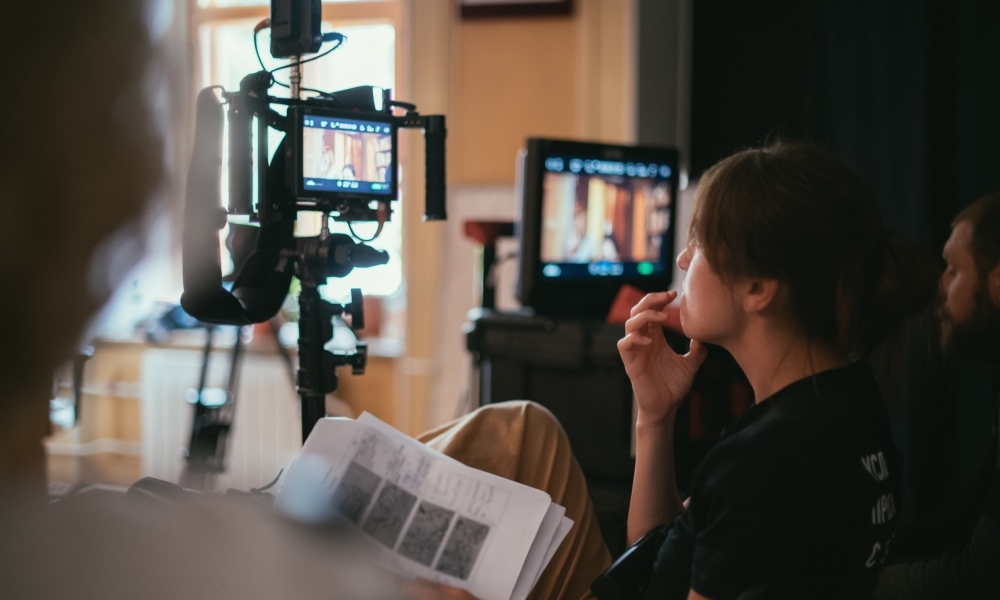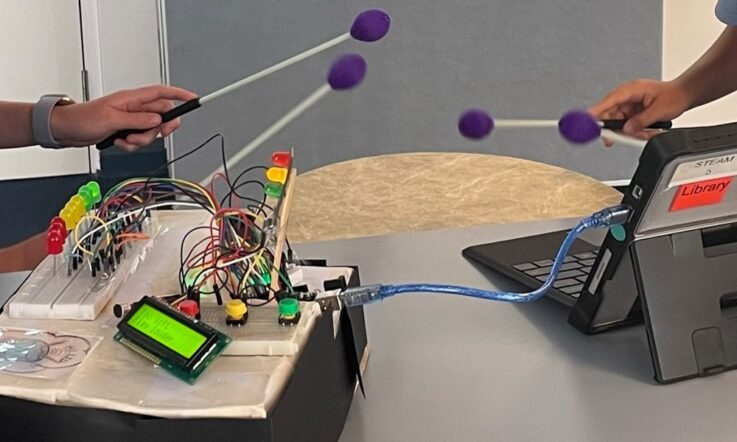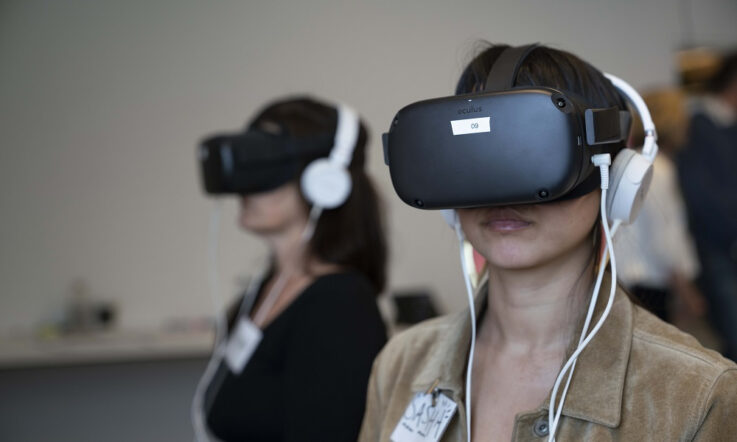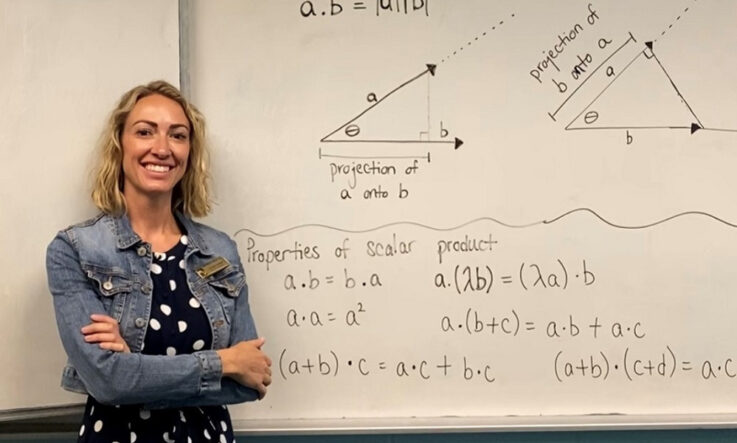Thanks for downloading this podcast from Teacher. I’m Dominique Russell.
If you work in a co-educational school, think about current student enrolments for STEM subjects and participation in STEM-related clubs and extracurricular activities. How do the post-school journeys of male and female students differ? Would you say there is a lower number of female students engaged in STEM in your school?
We know that, overall, female participation in Science, Technology, Engineering and Mathematics subjects is lower than that of males, and that schools can play an important part in encouraging girls to pursue education and careers in this area.
In this episode, I’m joined by Jessica Huynh, Ashanie Perera and Philip Callil. Jessica is the Managing Director of Go Girl, Go for IT, a free one-day technology conference for girls across Australia in Years 5 to 12. The conference aims to expose young girls to the world of IT and the many career options in the field.
Ashanie and Phil are teachers at Yarra Valley Grammar, a co-educational school in Melbourne. As Head of Mathematics and Director of IT and Digital Learning, respectively, the conference certainly piqued their interest. This year, they were able to send over 150 girls to the conference, and will share in this episode the impact this has had on their students.
Before we jump in, it would be great if you could take just a few moments to give a rating of our podcast if you’re listening to this audio on Apple podcasts or Spotify. If you’re listening on the Spotify app, just click on the three dots, then ‘rate show’, and if you’re on the Apple podcasts app you’ll find the rating section by scrolling down to the bottom of our podcast channel page. On Apple podcasts, you’re also able to leave a short review for us. Leaving us a rating or review helps more people like you find our podcast, and is a really big support for our team.
Thanks for taking the time to support the work we’re doing. Let’s dive into this episode.
Dominique Russell: So, thank you all for joining me on this podcast episode. Jessica, let’s start with you – can you tell me a little bit about Go Girl, Go for IT?
Jessica Huynh: Definitely, Dominique. So Go Girl, Go for IT’s a one-day technology conference. We actually encourage girls across Victoria from Grade 5 to Year 12 to come and learn all about the careers and opportunities available to them in STEAM – so, across Science, Technology, Engineering, Arts and Mathematics – and what a career in STEAM can mean for them.
Because I think what we find – and Phil and Ashanie can probably relate to this as well – is there’s some misconceptions and some stereotypes for what it means to be in one of those 5 disciplines. So Go Girl’s really a celebration and an awareness that there’s a lot more to just, technology than coding; there’s a lot more to just arts than drawing, or communications and art, all of that side of things as well. So, it’s really all about encouraging and inspiring girls that there’s are a lot more careers available for them than they think they knew originally.
DR: And so can you tell me a little bit more about the conference itself in terms of who’s actually involved, who’s there? How did it all come about to begin with? And how long has it been running for? This isn’t the first year, is it?
JH: So, the Go Girl, Go for IT conference has actually been running since 2001, back when it was originally run by Monash University. From, I think it’s 2002, VIC ICT for Women actually got involved and began running this more broadly, aimed at predominately that high school girl age group.
From there we’ve run it every 2 years since – noting obviously the pandemic occurred in the middle of the past few years, so we’ve actually had a 4 year gap between our last 2 in-person events. So, we did one back in 2018 and, most recently, the one on August 18 this year.
DR: And Ashani, you obviously at Yarra Valley Grammar sent a huge number of students to the conference this year, which we’ll talk about in a bit more detail in a minute, but just to get our listeners up to speed, can you tell me a little bit about the school context at Yarra Valley Grammar?
Ashanie Perera: Yeah absolutely. Interestingly, on conception of the school it was a boys’ school. But today, there’s about 1,400+ students and it’s growing quite strongly. We’ve got a 40:60 female to male ratio at the school and we cover everything from ELC to Senior School. We’ve got our middle years in there which is Year 7 through to 9 and senior years which are 10 through to 12.
And yeah, we had heaps of interest in this conference from middle years and our senior years students as well as the Year 5 and 6s which is beautiful, really awesome to see.
DR: And Phil, can you tell me about how you actually found out about the Go Girl, Go For IT conference, and why was it of interest to your school? Do you have any other initiatives in place at the school that are focused on female participation in technology and in STEAM? Or was this something that was going to offer something quite different for the students?
Philip Callil: It was interesting to hear Jess mention that Go Girls been going since 2001. In a past life, I was President of the Victorian IT Teachers’ Association and we used to run a very similar day for all students promoting IT, not so much in schools, but certainly the careers in IT.
So, I’ve been aware of the conference for quite a long period. We’ve sent girls from Yarra Valley Grammar really for, I think, probably 3 or 4 times already. Usually, it’s a group of girls of around about 40 students. Last year, when it ran online, I think we had about 70 students and that was terrific.
So, we’ve always known about it. But from the start, this year, I think there was a real awareness from all stakeholders that after 2 years of very limited contact and being stuck inside and not being able to get out and about, that this was just a great opportunity for our parents to give permission for their girls to go out and attend this conference.
So it was really good. So how we went about it was, it was always a collaboration between Ashanie and myself, Ashanie in her role as Head of Mathematics and my role as Director of IT and Digital Learning. However, no one really wants to hear from me for this particular conference. So Ashanie has the star power – she’s a great role model for our students. And with that, Ashanie sent out the comms, if you like, and Ashanie won’t tell you, but she was an engineer in a former life, I believe, and as Head of Mathematics as well, she’s a great role model for our students.
So what we did was we sent out the invitations in a way that they reached parents and our girls simultaneously, and with that we emphasised the importance of the next 30 years belonging to those with really good communication skills and technical skills and understanding.
And from there it just exploded. And we were in a really good position – we were able to receive permission from well over 200 families for our girls to go and attend the conference.
AP: I think we’re always looking for these sorts of opportunities to give our students this sort of exposure to STEM careers and just STEM pathways as well. And as Phil mentioned, in another life I was an engineer as well by training. And, for me, I have a bit of a personal bee in my bonnet to showcase to the girls that there are these STEM pathways out there and they’re really achievable, and they should look at it and not just write it off.
So yeah, it’s something that close to my heart. And so we’re always looking for these sorts of opportunities. From the Maths Faculty we run a number of competitions and summer schools and this sort of thing and try to advertise that to the student body as much as possible.
PC: As a co-educational school, Dominique, we hope to inspire both our girls and our boys in their participation in technology. So, in Year 8 we have a trimester course that all students participate [in] – it’s called ESSTEAM and it’s a series of rotating opportunities throughout the academic year in entrepreneurial studies, coding, maker space and food technology.
In Year 9 our students commence their IT pathways in subjects such as IT fundamentals, virtual design and development using Unreal engine [a computer game graphics engine]. And there’s also a very dynamic media course there as well.
Over recent years we’ve got a video studio that we’ve established for students that’s really taken hold with a 50/50 split between girls and boys with some outstanding, aspiring female directors creating short films that are proudly displayed on our digital panels around the school.
DR: Fantastic, and Phil, what were you hoping from all of these girls – I believe it was over 200 that ended up attending on the day – what did you hope they’d take away from attending a conference like this?
PC: Well if we’re taking everyone away, Dominique, it would have been about 216, but in the end, Ashanie of all people, was running an incursion for Maths students in Year 7, so we had to limit it to a mere 162 girls. But really, more seriously, we would hope that our girls have seen a glimpse of the opportunities that await them at university and the world of work after that.
School should be a great place to learn how to learn and to receive a preparation for their lives ahead of them. Invariably, their lives are going to be inextricably woven with technology playing a central part in their lives.
So, if our girls could see the opportunities that await those who have sound communication skills, as well as good technical skills and have an understanding of how people’s lives are going to be shaped around the use of, particularly, artificial intelligence, but coding, even spreadsheeting, then the conference has been really successful if it’s given them that glimpse.
DR: And Jessica, can you tell listeners about how the tech conference went? It was held in August so I’m interested in perhaps hearing a little bit more about maybe one or 2 highlights from the day.
JH: Yeah definitely. So, we actually kicked off on the morning of the 18th of August with an opening from an MP, but in addition we actually got the girls to be really exposed to some amazing things as part of their day at the Go Girl conference. In our trade show we had an AR dinosaur that the girls could actually interact with – imagine that when we were at school? I can’t imagine that, actually.
So we actually had some really awesome, incredible things that the girls were able to do and interact, and really see and hear from some amazing role models who were even graduate students, just about how they found their career and how they found themselves kind of stumbling into STEAM careers.
Probably one really notable thing that I would be keen to mention is we actually had one of the 2018 attendees come and actually speak to her future selves. So she was actually a speaker from one of our Friends of Go Girl Partners. And it was absolutely amazing for her to share her experiences from the 2018 event, and what she’s learnt since, to aspiring Grade 5s and 6s as part of the session that she was able to run.
DR: And Ashanie, at the time that we’re recording this episode it’s been about 2 weeks since the girls attended the conference. Can you share a little bit about what the students really thought about the conference once they’d attended? Did they have any highlights that they were sharing amongst themselves?
AP: Oh, yeah, absolutely. I think the girls were buzzing about quite a number of the workshops. So the day was sort of split where there were groups out doing different workshops and then there was the expo where a large number of students gathered together, and they got to go around and visit different stands and understand the different businesses that might hire people in STEM careers and just have chats to the professionals in the room.
But I think just some of the highlights – being back at school and talking to some of the girls – the workshops: there was a Deep Dive into AI that was quite popular; there was a Maths in Real Life workshop which the girls were raving about as well; a Forensics Analysis workshop. Now I didn’t go to any of these ones – I had the opportunity to go to one of them with the group that I was with for the day, but it sounds like there was a number of really fantastic workshops on.
There were panel discussions on where they got to, as Jessica just mentioned, hear from graduates – well, actually undergraduates that are still studying in film careers, for example, and how that’s interlinked with technology; that, I think got the girls quite excited. They were talking to IT professionals in the banking sector. So those panel discussions, I think, were really inspiring of them as well. And of course there was an Emotional Intelligence and sort of Leading from your Strengths workshop which was quite important in there as well.
But I think they got a lot out of the day, there was so much in there for them. Heaps of highlights. They were buzzing about it when they got back to school.
DR: Wonderful. And now that you are back at school, post conference, Phil, how do you plan on building on what the students were exposed to back at school? We’ve heard from Ashanie there the wide range of topics and sectors that were covered on the day, was quite impressive. So how do you plan on building on that now?
PC: It was impressive, Dominique. And certainly going back to our Year 7 students, they can’t wait to go to the next Go for Girls conference, so we’ve got a readymade cohort already willing to go.
All our students at the moment, Dominique, are going through the process of choosing their electives and pathways for next year. So we hope the sessions the girls attended will inspire them, not only to consider just technology subjects – naturally, we really want them to take off that IT pathway – but also for Maths and Science subjects with a view of choosing subjects that will expand their choices at university. The idea of keeping those choices open as long as they can, I think offers an incredible variety of careers for girls to choose. So, we’re really excited by that opportunity, that stimulus to be able to attend the conference at that time.
Also, the very generous offer of the ANZ Bank to host our students on a day at their headquarters in Melbourne is one that will give students another opportunity to see what the world of work might look like for them one day.
That’s all for this episode. Thanks for listening. We’ll catch you in our next episode very soon.
What is the situation in your own school – is there a gender imbalance in STEM-related subjects, clubs and extracurricular activities? Why do you think this might be? How do the post-school journeys of male and female students differ?
The teachers in this podcast provided an opportunity for female students to participate in a conference to learn more about STEM pathways and career opportunities. Could you and your colleagues do something similar in your own school?



